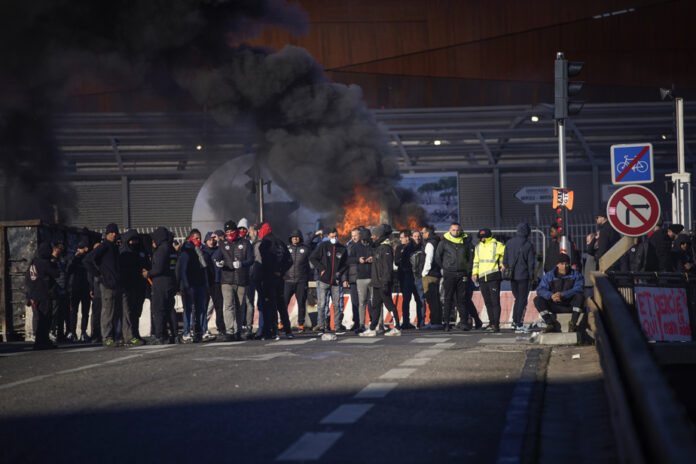(Paris) President Emmanuel Macron addresses the French on Wednesday in a long-awaited television interview to try to “appease” the anger against his pension reform adopted by forceps, and to explain how he intends to get out of a crisis that shows no signs of abating.
Very much behind since the start of the protest in January against this flagship reform of his five-year term, the French president gives an interview at 8 a.m. (Eastern time) on the TF1 and France 2 channels.
But on the eve of a new day of union mobilization, and while unauthorized and enamelled demonstrations of tension continue every evening throughout France, the Head of State intends to reiterate and assume his choices.
His troops have already warned that he will neither dissolve Parliament, nor reshuffle the government, nor call a referendum on his decried reform, which provides for the decline of the legal retirement age from 62 at age 64.
Mr. Macron also challenged “ the legitimacy ” of “ the crowd”, facing “ the people who express themselves through their elected representatives”, a statement reported by a parliamentarian who further fueled the anger of the protesters.
“ It’s yet another lack of respect, but it’s in his political DNA to despise us”, denounced Willy Dhellemmes, a union representative, at a roadblock filtering access to a fuel depot north of Bordeaux. (west).
“ There is a contempt for the trade unions, for the mobilizations which have been built […] for more than two months now ”, added Stéphane Riou, secretary general of the powerful CGT of Arsenal de Brest.
In the president’s own camp, we had little taste for this outing.
“ I would not have said things like that ”, noted the centrist François Bayrou on Wednesday.
“ The crowd must be heard and what I expect from the President of the Republic […] is precisely that he makes an uncompromising diagnosis of the situation ”, added Renaissance deputy (presidential majority) Gilles Le Gendre.
In the opposition, the socialist deputy Boris Vallaud described “ a frenzied president, one-on-one with himself ” while on the Republican right, Olivier Marleix considered that it was “ urgent that he rectify the situation , that he changes his vocabulary during his speech”.
On the far right, Marine Le Pen warned in an interview with AFP: “ I will not participate in putting out the fire ”.
While the French executive justified its project by the need to respond to the financial deterioration of pension funds and the aging of the population, France being one of the European countries where the legal retirement age is below, the argument was not heard by the population, the majority hostile to the reform.
And the forced passage of the government – which used a constitutional provision, article 49.3, allowing the adoption of a text without a vote – exacerbated the anger. So far peaceful and framed by the unions, the protest has given signs of radicalization for a week and tense exchanges oppose protesters and police every evening, especially in Paris.
Tuesday evening, 128 arrests were made in France, bringing to nearly a thousand the number of people arrested since last Thursday.
If the left denounced “ abusive arrests ”, the head of government Élisabeth Borne conversely paid “ tribute ” to the police and gendarmes, while recalling their “ duty to set an example”.
Strikes and blockades also continue, particularly in oil depots. Incidents erupted Tuesday in Fos-sur-Mer, near Marseille (south), where the authorities proceeded to requisition striking personnel when 12% of the country’s service stations are running out of gasoline or diesel.
The port of Marseille-Fos, one of the largest in France, was totally blocked as part of a “dead ports” day of action at the call of the CGT union and a highway in the Marseille region was closed due to pallet and tire fires set on fire by protesters.
In this flammable climate, President Macron’s intervention will be carefully scrutinized. From his troops, he asked for “ proposals ” for “ a change of method ”, and promised to “ move forward ” on “ health, school and ecology ” while organizing “ the society of full employment ” .


















